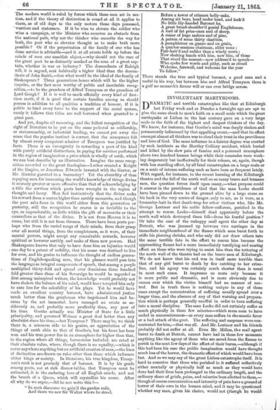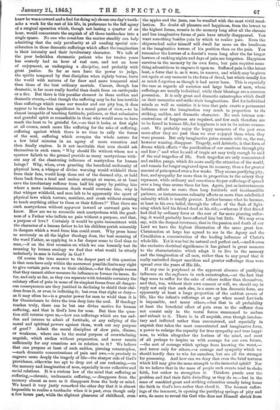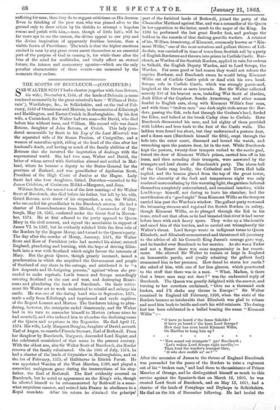INVOLUNTARY MARTYRDOMS.
DRAMATIC and terrible catastrophes like that at Edinburgh last Friday week and at Dundee a fortnight ago are apt to give the same shock to men's faith on a small scale which the great earthquake at Lisbon in the last century gave on a very large scale to the faith of the highest and deepest thinkers of the day. We know, for instance, that Goethe's mind was deeply shaken and permanently influenced by that appalling event,—and that its effect amongst almost all thinkers was to cloud their trust in the providence and love of God. The same influence in a fainter degree was exerted by such incidents as the Hartley Colliery accident, which buried and killed by the slow pain of famine and a poisoned atmosphere above two hundred human beings while their comrades were work- ing desperately but ineffectually for their release, or, again, though with less startling effect, by all fatal catastrophes on a large scale or on a scale of intense suffering such as have been so frequent lately. With regard, for instance, to the recent burning of the Edinburgh theatre and the fall of the north wall on so many brave and humane men, the question forces itself upon many,—what purpose could it answer in the providence of God that the man Lecke should have been pinned down to the ground alive by a large stone on his back in the very centre of danger, only to act, as it were, as a humanity-bait in that death-trap for other victims who, like Mr. George Lorimer and his noble fellow-sufferers, perished in the attempt to rescue Leeke—himself dead apparently before the north wall which destroyed them fell—from his fearful position ? Or take the case of the unhappy mail agent the other day at Detroit, who was jammed up between two carriages in the immediate neighbourhood of the flames which soon burst forth to stifle his piercing shrieks, and who only did not draw others into the same terrible fate in the effort to rescue him because the approaching flames had a more immediately terrifying and scaring effect on those who were trying to assist him than the tottering of the north wall of the theatre had on the brave men of Edinburgh. We do not know that his end, was in itself more terrible than that of any girl burnt to death by fire catching to her crino- line, and his agony was certainly much shorter than is usual in most such cases. It impresses us more only because it is more public and dramatic, and is more obviously due to causes over which the victim himself had no manner of con- trol. But in truth there is nothing unique in any of these cases except the concentration of suffering usually spread over a longer time, and the absence of any of that warning and prepara- tion which is perhaps generally needful in order to turn suffering into a moral discipline. The man Leeke did not certainly suffer as much physically in those few minutes—which seem soon to have ended in unconsciousness—as every man suffers in rheumatic fever or a bad attack of the gout. The suffering and suspense were con- centrated for him,—that was all. And Mr. Lorimer and his friends probably did not suffer at all. Even Mr. Millen, the mail agent burnt to death at Detroit, cannot have had in those few moments anything like the agony of those who are saved from the flames to perish in the next few days of the effect of their burns,—although if this had been his case the public imagination would have thought much less of the horror, the dramatic effect of which would have been lost. And so we may say of the great Lisbon catastrophe itself. It is hard to conceive that those who perished in it suffered collectively either mentally or physically half as mach as they would have done had their lives been prolonged to the ordinary length, and the ordinary share of griefs, pains, and miseries been allotted to them,— though of course concentration and intensity of pain have a ground of horror of their own in the human mind, and it may be questioned whether any man, given his choice, would not (though he would know he was a coward and a fool for doing so) choose one day's tooth- ache a week for the rest of his life, ii preference to the full agony of a surgical operation which, though not lasting a quarter of an hour, would concentrate the anguish of all those toothaches into a single spasm. No one who considers the matter steadily can help admitting that the only peculiarity at all needing special con- sideration in those dramatic sufferings which affect the imagination is their intenaity and their involuntary character. We talk of the poor bedridden rheumatic patient who for twelve years has scarcely had an hour of real ease, and not an hour of enjoyment, as undergoing a discipline, and probably with great justice. So far as men have the power to judge, the spirits tempered by that discipline when rightly borne, leave the world with natures of far finer and more tempered steel than those of the best ordinary mortals. Cancer, though less dramatic, is far more really fearful than death from an earthquake or a fire. But there is this peculiar element in these sudden and dramatic events,—that though the suffering may be far leas terrible than sufferings which rouse our wonder and our pity less, it does appear to be also less significant in a moral point of view,—to be almost incapable of teaching fortitude, patience, or that submissive and grateful spirit so remarkable in those who would seem to have much the least to be grateful for,—so that it looks, at first sight at all events, much more like suffering for the sake of suffering, suffering against which there is no time to rally the forces of the soul, suffering which occupies the whole nature for a few brief minutes in an agony of mere sensation and then finally expires. Is it not inevitable that men should ask themselves in such cases, "Why should He without whom not a sparrow falleth to the ground provide so many martyrdoms with- out any of the chastening influence of martyrdom for human beings? Why, when, even granting the beneficial uniformity of physical laws, a whisper of divine warning would withhold them from their fate, would keep them out of the doomed city, or hold them back from a fatal and useless attempt at rescue, or at least save the involuntary sufferer from half his agony by putting him where a more instantaneous death would overtake him, why is that whisper withheld, and men left to be apparently the sport of physical laws which torture, mutilate, and crush without seeming to teach anything either to them or their fellows ?" That there are such martyrdoms without apparent inward or outward gain we know. How are we to reconcile such martyrdoms with the good- ness of a Father who inflicts no pain without a purpose, and that, a purpose of love? Certainly it would be quite inconsistent with the character of a human father to let his children perish miserably in dangers which a word from him could avert. Why press home so anxiously as all the higher theology does, the best meaning of the word Father, as applying in a far deeper sense to God than to man,—if on the first occasion on which we can honestly test its meaning by human analogy we find that what would be utterly unfatherly in man is fatherly in God ?
Of comae the true answer to the deeper part of this question is that men have only within the narrowest possible limits any right to give certain pain even to their children,...-for the simple reason -that they cannot either measure its influence or foresee its issues. So far, and only so far, as they can separate with tolerable certainty the salutary effect of pain in some of its simplest forma from all danger- ous consequences are they justified in declining to shield their chil- dren from it, or even in inflicting it; but even that right or duty— as it may often be—is a greater power for men to wield than it is for Omniscience to drive the iron deep into the soul. If theology teaches truly, there can be but one divine motive for human suffering, and that is God's love for man. But then the ques- tion still returns upon us,—how can sufferings which are too sad- aen and intense to admit of fortitude, or any rallying of the moral and spiritual powers against them, work out any purpose a good ? Admit the moral discipline of slow pain, disease, or weakness, where can be the moral purpose of overwhelming anguish, which strikes without preparation, and never remits sufficiently for any conscious act in relation to it ? We believe that one purpose at least of suck sudden, piercing catastrophes, —such dramatic concentrations of pain and awe,—is precisely to engrave more deeply the tragedy of life—the sharper side of God's providence, otherwise too apt to drop out of ear reckoning,—on the memory and imagination of men, especially in our collective and social relations. It is a curious law of the mind that suffering as suffering,—chronic, undramatic suffering, — disappears from the memory almost as noon as it disappears from the body or mind. We heard it very justly remarked the other day that it is almost - impossible to realize a toothache when it is past, even though only a few hours past, while the slightest pleasures of childhood, even the apples and the jams, can be recalled with the most vivid recol- lection. No doubt all pleasure and happiness, from the lowest to the highest forms, remain in the memory long after all the chronic and leas imaginative forms of pain have utterly disappeared. You want something besides pain by which to realize pain. Even the shipwrecked sailor himself will dwell far more on the loneliness or the imaginative terrors of his position than on the pain. You remember the horrors of a dentist's room long after the far longer horrors of racking nights and days of pain are forgotten. Happiness survives in the memory by its own force, but pain requires some- thing adventitious to engrave it upon us. Suffered pain is like latent heat, a force that is, as it were, in reserve, and which may be given out again at any moment in the form of dread, but which usually lies as much forgotten as though it had never been. This is especially the case as regards all societies and large bodies of men, whose sufferings are usually individual, while their blessings are a common possession. It is only great and dramatic catastrophes which dwell on their memories and strike their imaginations. But for individual minds as well as societies it is true that pain exerts a permanent influence over the imagination very much in proportion to its striking, sudden, and dramatic character. No such intense con- centrations of happiness are required, and few such therefore are to be found in human life, for happiness is not in its nature evanes- cent. We probably enjoy the happy moments of the past even more after they are past than we ever enjoyed them when they were present. But only imaginative pains remain with us, the rest, however wearing, disappear. Tragedy, said Aristotle, is that form of drama which effects "the purification of our emotions through pity and fear ;" and what he said of tragic art may truly enough be said of the real tragedies of life. Such tragedies are only concentrated and sudden pangs, which fix more easily the attention of the world, and remain far longer engraved upon its memory, than a far greater amount of pain spread over a few weeks. They arouse purifying pity, fear, and sympathy far more than in proportion to the misery they represent, while ordinary and sometimes deeper sufferings if spread over a long time arouse them far less. Again, just as instantaneous heroism affects us more than long fortitude and inexhaustible patience, so instantaneous calamity affects us more than subdivided calamity which is usually greater. Luther became what he became, at least in his own belief, through the effect of the flash of light- ning which laid his friend dead at his side,—whereas if that friend had died by ordinary fever at the cost of far more piercing suffer- ing, it would probably have affected himbut little. We may even say, with the deepest reverence, that in the passion and death of our Lord we have the highest illustration of the same great law. Christendom at large has agreed to see in the Agony and the Crucifixion a concentration of the healing influence of Christ's whole life. Yet it was but its natural and perfect end,—and it owes the exclusive doctrinal significance it has gained in great measure to the characteristics which adapt it to live in the memory and the imagination of all men, rather than to any proof that it really embodied deeper sacrifices and greater sufferings than were spread over the years of His life.
If any one is perplexed at the apparent absence of purifying influence on the sufferers in such catastrophes,—at the fact that they seem to suffer for the sake of others rather than themselves, and that, too, without their own consent or will, we should say in reply not only that such also, in a more or less dramatic form, are apparently at least a large proportion of the saddest events of life, like the infant's sufferings at an age when moral iortitude is impossible, and many others,—but that in all probability at least the beneficial effect of pain even to the sufferer does not consist only in the moral forces summoned to endure and submit to it. There is in all anguish, even though involun- tary and inflicted rather than encountered, and especially in anguish that takes the most concentrated and imaginative form, a power to enlarge the capacity for true sympathy and true happi- ness, to widen altogether the horizon of the mind, and most of all perhaps to inspire us with courage for our own future, —the sort of courage which springs from knowing the worst,— and terror only for others,—a courage and sympathy which we should hardly dare to win for ourselves, but are all the stronger for possessing. And how can we deny that even the brief tortures which kill may give the same strength to the immortal spirit? Nor do we believe that in the mass of people such events tend to shake faith, but rather to strengthen it. Thinkers puzzle over the problem and find their faith dwindling as they do so,—but in the mass of mankind great and striking calamities usually bring home the faith in God's love rather than cloud it. The keenest suffer- ings of the innocent, in opening the purifying springs of pity and awe, do more to reveal the God who does not Himself shrink from suffering for man, than they do to suggest criticisms on His decrees. Even in thinking of the poor man who was pinned alive to the ground only to draw others by his shrieks to attempt a hopeless rescue and perish with him,—men, though of little faith, will be far more apt to see the unseen, the divine appeal to our pity and the divine inspiration of apparently fruitless heroism, than a visible frown of Providence. The truth is that the higher emotions excited in man by any great event assert themselves as an essential part of the purpose of God in causing it, for while these alter the bias of the mind for multitudes, and vitally affect an eternal future, the intense and momentary agonies—which are the only peculiar characteristic of these events—are measured by the momenta they endure.
































 Previous page
Previous page